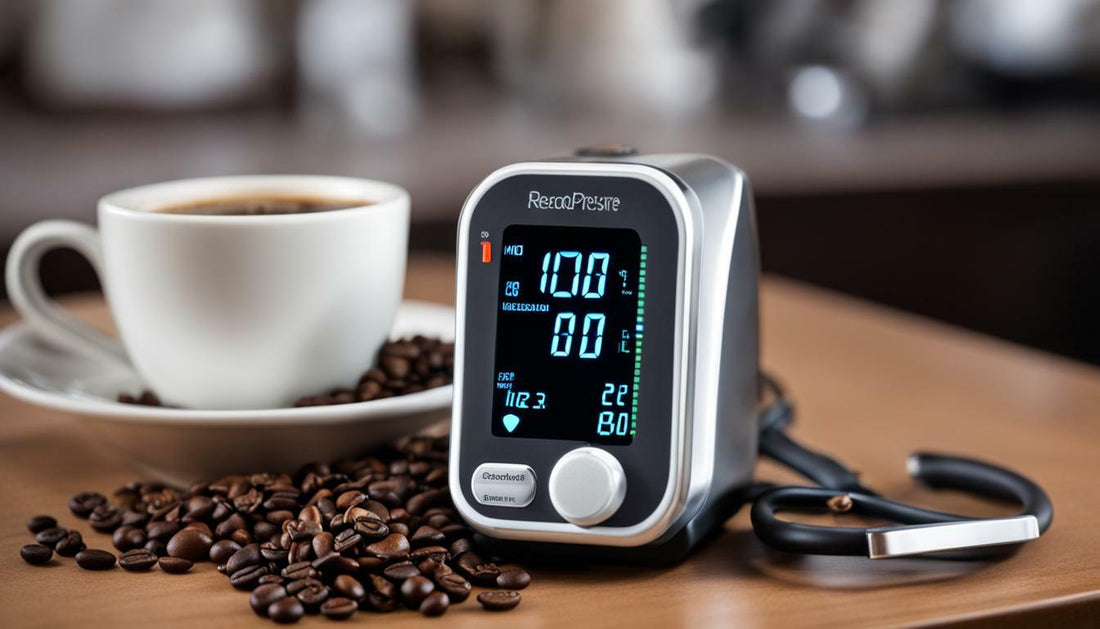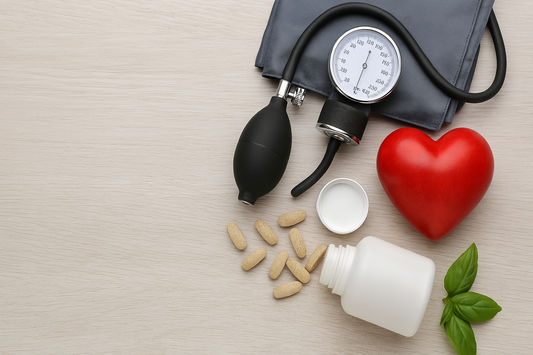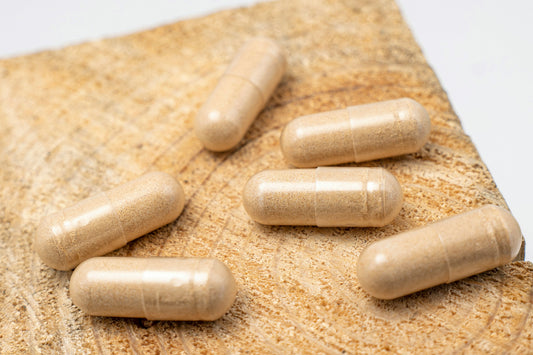Does Caffeine Raise Blood Pressure?
Many people wonder if consuming caffeine can have an impact on their blood pressure levels. The answer is yes, but it's important to understand the full picture. While caffeine in coffee can temporarily raise blood pressure, it does not have negative long-term effects. In fact, regular coffee consumption has been linked to a range of health benefits, including a lower risk of type 2 diabetes, increased physical activity, weight loss, lower rates of depression, and a lower risk of heart disease and death from heart-related problems.
Key Takeaways:
- Caffeine in coffee temporarily raises blood pressure, but it does not have negative long-term effects.
- Regular coffee consumption may have health benefits, including a lower risk of type 2 diabetes, increased physical activity, weight loss, lower rates of depression, and a lower risk of heart disease and death from heart-related problems.
- The recommended safe daily limit for caffeine is less than six cups of coffee.
- Drinking tea, including green and black tea, may also have beneficial effects on heart health and help lower blood pressure.
- Moderation is key, and if you are concerned about how caffeine is affecting your blood pressure, it's important to take steps to lower it.
The Effects of Caffeine on Blood Pressure
Caffeine, found in various beverages and foods, has been shown to temporarily increase blood pressure. When consumed, caffeine stimulates the release of stress hormones, such as adrenaline, which can constrict blood vessels and cause blood pressure to rise. However, these effects are typically short-lived and do not have negative long-term consequences.
In fact, regular coffee consumption has been associated with several health benefits. Studies have shown that individuals who drink coffee regularly have a lower risk of developing type 2 diabetes. Additionally, the caffeine in coffee can boost physical activity and aid in weight loss, further promoting overall health. Furthermore, coffee drinkers have been found to have lower rates of depression and a reduced risk of heart disease and death from heart-related problems.
It is important to note that the recommended safe daily limit for caffeine intake is less than six cups of coffee. Exceeding this limit may lead to adverse effects, including increased heart rate, restlessness, and even anxiety. Therefore, moderation is key when consuming caffeinated beverages.
The Role of Tea in Heart Health
While coffee is often associated with caffeine consumption, tea, particularly green and black tea, can also have beneficial effects on heart health. These teas contain compounds called catechins and flavonoids, which have been shown to help lower blood pressure and reduce the risk of cardiovascular diseases.
Research has suggested that drinking tea regularly can improve the health of blood vessels, promote the dilation of arteries, and reduce inflammation. These effects contribute to better blood pressure regulation and overall heart health. Incorporating tea into your daily routine can be a flavorful way to support a healthy cardiovascular system.
| Health Benefits of Tea | Keywords |
|---|---|
| Lower blood pressure | tea and blood pressure |
| Improved blood vessel health | tea and cardiovascular health |
| Reduced risk of heart disease | tea and heart health |
In conclusion, while caffeine may temporarily raise blood pressure, it does not have negative long-term effects. Regular coffee consumption may have various health benefits, such as a reduced risk of type 2 diabetes and heart disease. Tea, particularly green and black tea, can also contribute to heart health and blood pressure regulation. The key is to consume caffeine in moderation and be mindful of your overall health and well-being.
Researchers have been studying the potential relationship between caffeine intake and the development of hypertension. While caffeine in coffee may temporarily raise blood pressure, there is no strong evidence to suggest that it has negative long-term effects. In fact, regular coffee consumption may actually have several health benefits.
A study published in the American Journal of Clinical Nutrition found that moderate coffee consumption was associated with a lower risk of type 2 diabetes. Another study conducted by the Harvard School of Public Health suggested that coffee drinkers were more likely to engage in regular physical activity and experience weight loss, both of which can contribute to overall heart health.
Furthermore, coffee consumption has also been linked to a lower incidence of depression. A study conducted by the Harvard T.H. Chan School of Public Health found that women who drank four or more cups of coffee per day had a 20% lower risk of developing depression compared to non-coffee drinkers. Additionally, a review of studies published in the American Heart Association journal suggested that regular coffee consumption may be associated with a lower risk of heart disease and death from heart-related problems.
It's important to note that the recommended safe daily limit for caffeine is less than six cups of coffee. Excessive caffeine intake can lead to symptoms such as jitteriness, increased heart rate, and difficulty sleeping. However, if consumed in moderation, coffee and other caffeinated beverages can be enjoyed as part of a balanced diet.
In addition to coffee, drinking tea, including green and black tea, may also have beneficial effects on heart health and help lower blood pressure. A study published in the Archives of Internal Medicine found that individuals who consumed more than two cups of tea per day had a significantly lower risk of developing hypertension compared to those who consumed less than one cup per day.
In conclusion, while caffeine in coffee may temporarily raise blood pressure, there is no substantial evidence to suggest that it has negative long-term effects on hypertension. In fact, regular coffee consumption may have several health benefits, including a lower risk of type 2 diabetes, increased physical activity, weight loss, lower rates of depression, and a lower risk of heart disease and death from heart-related problems. It's essential to consume caffeine in moderation and be mindful of your overall lifestyle choices to maintain healthy blood pressure levels.
Caffeinated Beverages and Blood Pressure
It's important to consider the specific beverages that contain caffeine and their potential impact on blood pressure. While caffeine in coffee has been shown to temporarily raise blood pressure, there is no evidence to suggest that it has negative long-term effects on blood pressure levels. In fact, regular consumption of coffee may actually have several health benefits.
Studies have found that regular coffee consumption is associated with a lower risk of developing type 2 diabetes. Coffee drinkers also tend to engage in more physical activity and may experience weight loss, which can contribute to better overall heart health. Additionally, coffee has been linked to lower rates of depression and a reduced risk of heart disease and death from heart-related problems.
It's worth noting that the recommended safe daily limit for caffeine intake is generally less than six cups of coffee. However, individual sensitivity to caffeine can vary, and it's important to listen to your body's cues. If you find that caffeine is affecting your blood pressure, it may be beneficial to reduce your consumption and explore other alternatives.
Another popular caffeinated beverage to consider is tea. Both green and black tea have been shown to have beneficial effects on heart health and may help lower blood pressure. Incorporating tea into your daily routine can be a great way to enjoy a warm beverage while potentially reaping health benefits.
Overall, moderation is key when it comes to caffeine consumption and its potential impact on blood pressure. If you are concerned about how caffeine is affecting your blood pressure, it's always a good idea to consult with your healthcare provider. They can provide personalized advice and guidance to help you make informed decisions about your caffeine intake and overall heart health.
While caffeine can temporarily raise blood pressure, research suggests that it does not have significant long-term negative effects. For individuals without existing health conditions, moderate consumption of caffeine is generally considered safe. In fact, regular coffee consumption has been associated with several health benefits.
Studies have shown that individuals who regularly consume coffee have a lower risk of developing type 2 diabetes. The antioxidants present in coffee may help improve insulin sensitivity and reduce inflammation in the body, both of which are important factors in diabetes prevention. Additionally, coffee contains caffeine, which can stimulate physical activity and increase metabolism, potentially aiding in weight loss.
Coffee has also been linked to a lower risk of depression. The caffeine in coffee acts as a mild stimulant, boosting mood and increasing alertness. Furthermore, the antioxidants in coffee may have protective effects on brain health.
When it comes to heart health, research suggests that moderate coffee consumption can be part of a healthy lifestyle. Drinking coffee has been associated with a lower risk of heart disease and death from heart-related problems. However, it is important to note that excessive caffeine intake can have negative effects, such as increased heart rate and palpitations. That's why it is essential to adhere to the recommended safe daily limit for caffeine, which is generally considered to be less than six cups of coffee.
Benefits of Regular Coffee Consumption
- Lower risk of type 2 diabetes
- Increased physical activity
- Weight loss
- Lower rates of depression
- Lower risk of heart disease and death from heart-related problems
While caffeine can temporarily raise blood pressure, it is important to remember that moderate consumption of caffeine, particularly from sources like coffee and tea, is generally safe for most individuals. The key lies in moderation and being mindful of your overall caffeine intake. If you are concerned about how caffeine may be affecting your blood pressure, it's always a good idea to consult with a healthcare professional. Taking steps to lead a healthy lifestyle, including regular exercise and maintaining a balanced diet, is also important for maintaining optimal blood pressure levels.
| Fact | Source |
|---|---|
| Caffeine can temporarily raise blood pressure | Mayo Clinic |
| Regular coffee consumption is associated with a lower risk of type 2 diabetes | Harvard School of Public Health |
| Coffee contains antioxidants that may have protective effects on brain health | Alzheimer's Association |
| Moderate coffee consumption is linked to a lower risk of heart disease and death from heart-related problems | American Heart Association |
Benefits of Regular Coffee Consumption
Enjoying coffee in moderation has been linked to several health benefits, including a reduced risk of type 2 diabetes and improved mental well-being. While caffeine in coffee temporarily raises blood pressure, it does not have negative long-term effects on blood pressure levels. In fact, regular coffee consumption may have positive effects on overall health.
Studies have shown that individuals who drink coffee regularly may have a lower risk of developing type 2 diabetes. The antioxidants and other bioactive compounds present in coffee have been found to improve insulin sensitivity and regulate blood sugar levels. Additionally, coffee contains chlorogenic acid, which has been associated with a decreased risk of developing insulin resistance.
Furthermore, coffee can also boost physical activity and aid in weight loss. Caffeine, a natural stimulant found in coffee, has been shown to increase metabolism and enhance fat burning. It can also improve athletic performance by increasing endurance and reducing perceived exertion during exercise. These effects can contribute to weight loss efforts and overall physical well-being.
In addition to its physical health benefits, regular coffee consumption has also been linked to improved mental well-being. Coffee contains caffeine, which stimulates the central nervous system and can enhance mood, attention, and cognitive function. Studies have shown that moderate coffee intake is associated with a lower risk of depression and a reduced incidence of suicide. However, it's important to note that excessive caffeine consumption may have the opposite effect, so moderation is key.
| Health Benefit | Description |
|---|---|
| Reduced risk of type 2 diabetes | Coffee may improve insulin sensitivity and regulate blood sugar levels. |
| Increased physical activity | The caffeine in coffee can boost metabolism and enhance fat burning, leading to increased physical activity and weight loss. |
| Improved mental well-being | Moderate coffee consumption has been associated with a lower risk of depression and improved cognitive function. |
| Lower risk of heart disease and death from heart-related problems | Regular coffee consumption has been linked to a reduced risk of heart disease and cardiovascular mortality. |
It's important to note that the recommended safe daily limit for caffeine is generally considered to be less than six cups of coffee. Exceeding this limit may lead to negative side effects, such as increased anxiety, disrupted sleep patterns, and elevated blood pressure. Therefore, moderation is key when it comes to consuming coffee or any caffeinated beverages.
In addition to coffee, drinking tea, including green and black tea, may also have beneficial effects on heart health and help lower blood pressure. These teas contain compounds known as catechins and flavonoids, which have antioxidant properties and may contribute to cardiovascular health.
In conclusion, enjoying coffee in moderation can be part of a healthy lifestyle and may provide various health benefits. Regular coffee consumption has been linked to a reduced risk of type 2 diabetes, increased physical activity, improved mental well-being, and a lower risk of heart disease and death from heart-related problems. However, it's essential to consume coffee and other caffeinated beverages in moderation, following the recommended daily limits, to avoid potential negative effects on blood pressure and overall health.
To avoid potential negative effects on blood pressure and overall health, it is crucial to adhere to the recommended safe limit for caffeine consumption. The American Heart Association suggests that consuming less than six cups of coffee per day is generally considered safe for most individuals. However, it's important to note that caffeine sensitivity can vary from person to person, so it's always best to listen to your body and adjust your intake accordingly.
When it comes to assessing caffeine content in beverages, it's worth noting that different types of coffee and tea contain varying amounts. For example, a typical 8-ounce cup of coffee contains about 95 milligrams of caffeine, while a 1-ounce shot of espresso contains approximately 63 milligrams. On the other hand, a cup of black tea typically contains 47 milligrams of caffeine, while green tea contains around 28 milligrams.
When it comes to energy drinks and other caffeinated beverages, it's important to be cautious, as their caffeine content can vary greatly. It's recommended to check the label or consult with a healthcare professional to determine the caffeine levels in these drinks.The Impact of Caffeine on Blood Pressure
It's worth noting that while caffeine does temporarily raise blood pressure, it does not have negative long-term effects. The increase in blood pressure is typically temporary, and once the effects of caffeine wear off, blood pressure levels return to normal. However, if you have existing high blood pressure or are sensitive to caffeine, it's important to monitor your intake and consult with a healthcare professional for personalized advice.
- Regular coffee consumption may actually have health benefits beyond its effects on blood pressure. Studies have shown that moderate coffee consumption is associated with a lower risk of type 2 diabetes, increased physical activity, and weight loss.
- Coffee has also been linked to a lower risk of depression and a reduced risk of heart disease and death from heart-related problems.
While caffeine in moderation can be enjoyed as part of a healthy lifestyle, it's important to listen to your body, be mindful of your caffeine intake, and make informed choices to maintain your overall well-being.
The Role of Tea in Heart Health
Tea consumption, particularly green and black tea, has been associated with positive effects on heart health and blood pressure. These popular beverages are not only delicious but also offer potential benefits that can contribute to overall cardiovascular well-being. Research has shown that the compounds found in tea, such as catechins and flavonoids, possess antioxidant and anti-inflammatory properties that can have a positive impact on heart health.
Studies have suggested that regular consumption of tea, especially green and black tea, may help lower blood pressure levels. The polyphenols present in tea have been found to promote relaxation of blood vessels, which can contribute to improved blood flow and reduced blood pressure. This can be especially beneficial for individuals with hypertension or those at risk of developing high blood pressure.
Additionally, tea has been linked to a reduced risk of heart disease. Research has indicated that the antioxidant properties of tea can help protect against the oxidation of LDL cholesterol, known as "bad" cholesterol, which plays a critical role in the development of heart disease. By inhibiting the oxidation process, tea consumption may help prevent the formation of plaque in the arteries and reduce the risk of cardiovascular events.
Incorporating tea into your daily routine can be a simple and enjoyable way to promote heart health. Whether you prefer a warm cup of green tea or a robust black tea, the beneficial effects on blood pressure and heart health make tea a wise choice. Remember to limit added sugars or sweeteners in your tea for maximum health benefits. So, why not sit back, relax, and savor a comforting cup of tea while taking care of your heart?
| Benefits of Tea for Heart Health | Types of Tea |
|---|---|
| Lowering blood pressure | Green tea |
| Reducing the risk of heart disease | Black tea |
| Protecting against oxidation of LDL cholesterol |
Steps to Lower Blood Pressure
Whether or not you consume caffeine, it is important to take proactive measures to help maintain healthy blood pressure. Here are some steps you can incorporate into your lifestyle:
- Adopt a balanced and nutritious diet: Include plenty of fruits, vegetables, whole grains, lean proteins, and healthy fats in your meals. Opt for low-sodium options and limit processed foods and sugary beverages.
- Engage in regular physical activity: Aim for at least 150 minutes of moderate-intensity aerobic exercise or 75 minutes of vigorous-intensity exercise per week. Activities like brisk walking, swimming, cycling, and dancing can help lower your blood pressure.
- Maintain a healthy weight: If you are overweight or obese, losing even a small amount of weight can make a significant difference in your blood pressure levels. Consult with a healthcare professional to develop a personalized weight loss plan.
- Reduce sodium intake: High sodium consumption can contribute to elevated blood pressure. Limit your intake by cooking at home, reading labels, and opting for low-sodium alternatives. Be mindful of added salt in processed foods and restaurant meals.
- Manage stress: Chronic stress can take a toll on your blood pressure. Find relaxation techniques that work for you, such as deep breathing exercises, meditation, yoga, or engaging in hobbies and activities you enjoy.
- Avoid tobacco and limit alcohol: Smoking and excessive alcohol consumption can raise blood pressure and damage your cardiovascular health. Quit smoking and drink alcohol in moderation, which means up to one drink per day for women and up to two drinks per day for men.
- Get enough sleep: Aim for 7-9 hours of quality sleep each night. Poor sleep can lead to elevated blood pressure and other health issues. Establish a regular sleep schedule, create a soothing bedtime routine, and create a comfortable sleep environment.
By implementing these steps into your daily routine, you can help lower your blood pressure and improve your overall health. Remember, always consult with a healthcare professional for personalized advice and guidance.
Alternative Therapies
In addition to the lifestyle changes mentioned above, some individuals may find alternative therapies helpful in managing their blood pressure. These therapies, such as acupuncture, massage, and relaxation techniques, can promote relaxation, reduce stress, and potentially lower blood pressure. While the evidence is not conclusive, discussing these options with a qualified healthcare professional may be beneficial.
| Foods to Include | Foods to Limit or Avoid |
|---|---|
| Fruits | Salted snacks |
| Vegetables | Sugary beverages |
| Whole grains | Processed meats |
| Lean proteins | Fast food |
| Healthy fats | Excessive alcohol |
"Taking steps to lower blood pressure is a proactive way to protect your overall health and well-being. By incorporating a balanced diet, regular exercise, stress management, and other healthy lifestyle habits, you can take control of your blood pressure and reduce your risk of developing hypertension. Remember, it's never too late to make positive changes that can make a big difference."
Moderation is Key
Like many aspects of our diet, moderation is key when it comes to caffeine intake and its effects on blood pressure. While caffeine in coffee may temporarily raise blood pressure, it does not have negative long-term effects on cardiovascular health. In fact, regular coffee consumption has been associated with various health benefits.
Studies have shown that individuals who consume coffee regularly have a lower risk of developing type 2 diabetes, thanks to certain compounds in coffee that enhance insulin sensitivity. Additionally, coffee has been found to increase physical activity and aid in weight loss, which can contribute to maintaining healthy blood pressure levels.
A cup of coffee in the morning may not only wake you up but also lower the risk of depression. Research has shown that coffee drinkers have lower rates of depression compared to non-coffee drinkers. Moreover, regular coffee consumption has been linked to a reduced risk of heart disease and death from heart-related problems.
It's important to note that while coffee can offer potential health benefits, moderation is crucial. The recommended safe daily limit for caffeine is generally considered to be less than six cups of coffee. Beyond this threshold, excessive caffeine intake may lead to side effects such as restlessness, sleep disturbances, and increased heart rate.
Drinking tea, including green and black tea, can also have beneficial effects on heart health and blood pressure regulation. These teas contain antioxidants and compounds that may help lower blood pressure levels and reduce the risk of heart disease.
To maintain healthy blood pressure levels, it's important to adopt a balanced lifestyle that includes a varied and nutritious diet, regular physical activity, stress management, and moderation in caffeine consumption. If you have concerns about how caffeine is affecting your blood pressure, consult with a healthcare professional who can provide personalized guidance and recommendations.
Conclusion
Understanding the relationship between caffeine and blood pressure is crucial for making informed decisions about your health. While it's true that caffeine in coffee can temporarily raise blood pressure, it does not have negative long-term effects. In fact, regular coffee consumption may have health benefits such as a lower risk of type 2 diabetes, increased physical activity, weight loss, lower rates of depression, and a lower risk of heart disease and death from heart-related problems.
It's important to note that the recommended safe daily limit for caffeine is less than six cups of coffee. Consuming more than this amount may lead to increased blood pressure levels. However, drinking tea, including green and black tea, may also have beneficial effects on heart health and help lower blood pressure. These alternatives can provide a satisfying beverage option with potential health benefits.
Overall, moderation is key when it comes to caffeine consumption. If you are concerned about how caffeine is affecting your blood pressure, it's important to take steps to lower it. This can include maintaining a healthy diet, incorporating regular exercise, managing stress levels, and monitoring your caffeine intake. By doing so, you can enjoy the potential benefits of caffeine without compromising your cardiovascular health.
Frequently Asked Questions about Caffeine and Blood Pressure
FAQ
Does caffeine raise blood pressure?
Caffeine in coffee temporarily raises blood pressure, but it does not have negative long-term effects.
What are the effects of caffeine on blood pressure?
Caffeine can temporarily raise blood pressure levels, but the impact is usually short-lived.
What is the relationship between caffeine and hypertension?
While caffeine consumption can cause a temporary spike in blood pressure, it is not a direct cause of hypertension.
How do caffeinated beverages affect blood pressure?
Different caffeinated beverages, such as coffee and tea, can have varying effects on blood pressure levels.
Is caffeine linked to elevated long-term blood pressure?
Regular caffeine consumption does not have long-term effects on blood pressure levels or lead to chronic hypertension.
What are the benefits of regular coffee consumption?
Regular coffee consumption may have various health benefits, including a lower risk of type 2 diabetes, increased physical activity, weight loss, lower rates of depression, and a lower risk of heart disease and death from heart-related problems.
What is the recommended safe daily limit for caffeine?
The recommended safe daily limit for caffeine is less than six cups of coffee.
Does drinking tea have any impact on heart health and blood pressure?
Drinking tea, including green and black tea, may have beneficial effects on heart health and help lower blood pressure.
What are some steps to lower blood pressure?
Regardless of caffeine intake, individuals can take steps to lower their blood pressure levels, such as maintaining a healthy diet and lifestyle.
Why is moderation key when it comes to caffeine consumption?
Moderation is important to ensure the potential health benefits of caffeine while minimizing the risks of negative effects on blood pressure.
What are the main takeaways from this article?
This article highlights that caffeine in coffee temporarily raises blood pressure, but it does not have negative long-term effects. Regular coffee consumption may have health benefits, including a lower risk of type 2 diabetes, increased physical activity, weight loss, lower rates of depression, and a lower risk of heart disease and death from heart-related problems. The recommended safe daily limit for caffeine is less than six cups of coffee. Drinking tea, including green and black tea, may also have beneficial effects on heart health and help lower blood pressure. Overall, moderation is key, and if you are concerned about how caffeine is affecting your blood pressure, it's important to take steps to lower it.






